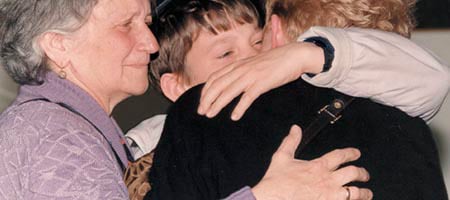Twenty-one years after it occurred, repercussions from the Chernobyl nuclear reactor disaster still reverberate in Ukraine.
But more than 2,300 youths and teenagers from the affected region have been given new lives in Israel as a result of a long-term Chabad-Lubavitch project designed to rescue them from the blighted area.
Rabbi Arye Raichman, today a Chabad-Lubavitch emissary in Kyrgyzstan, says he will never forget the "tzadik from Leningrad" who came to his town with Chassidic clothing and a flowing beard and tugged at his parents’ heart strings.
"He was like a fairy tale character," says Raichman. "I laugh today, because I look like him now. But it was the first time we had seen a Jew dressed like that. He completely convinced my parents and a good number of family members. So, when I left, there were a lot of kids I knew going with me. That way it was less threatening and less difficult."
On April 25, 1986, during a test of one of the reactors at the Chernobyl nuclear power plant 80 miles north of Kiev, a chain reaction inside the reactor set off explosions and a fireball that blew off the reactor's heavy steel and concrete lid. The nuclear disaster killed more than 30 people immediately and caused 135,000 people to be evacuated as a result of high radiation levels in a 20-mile radius.
In the two decades since the disaster, considered the world's worst nuclear power accident, an estimated one in 16 of Ukraine's 49 million people have suffered from grave health disorders linked to the incident, and more than 70,000 have been left fully disabled.
But more than 2,300 "Children of Chernobyl" have been brought to Israel for treatment, care, and support in the last 16 years by a project created by Israel's Chabad Youth Organization, at the request of the Lubavitcher Rebbe, Rabbi Menachem Mendel Schneerson, of righteous memory.
Exposed to radiation in food, milk, water, and soil, and faced with a lack of government response, desperate Ukrainian parents unable to find medical care or relief from radiation contamination cried out for help.
The Rebbe heard their suffering. Concerned for the parents and the imminent dangers facing their children, the Rebbe directed Chabad in Israel to provide a complete and immediate response: Evacuate the children from their surroundings as quickly as possible and provide them with medical care, food and education for as long as required.
Once in Israel, the children would be safe from contamination and protected from medical neglect.
Since Chabad’s Children of Chernobyl Project began in August 1990, 2,479 children aged six to 12 have been evacuated and brought to Israel on 78 different flights from the republics of Belarus and Ukraine.
The program has won praise from global relief organizations. The World Health Organization's Dr. Keith Baverstock says Children of Chernobyl has been among the leading organizations for humanitarian aid.
"Chabad is working with international organizations such as the World Health Organization, UNESCO, and Unicef," he says.
Taken to Kfar Chabad upon arrival, the children are provided with medical care, psychological support, education, support and a safe environment away from the dangers and implications of Chernobyl.
"All the parents wanted the same thing," says Gershon Rabinowitz, who was rescued from the area in his teens. "To get their children out."
Recently married, Rabinowitz was one of the first generation of those rescued. In the days after the disaster, he says, black rain fell in his village. Geiger counters were brought into his parents’ home, and radiation was detected.
"We were afraid to eat vegetables; we stopped buying fresh milk at the neighboring village," he says. "Children in my class were contracting leukemia. We were terribly frightened."
At the same time, Chabad delegates began working in the area. His parents heard they were offering to take Jewish children to Israel, and they jumped at the opportunity.

As part of their agreement with Chabad, parents of children brought to Israel are supposed to join them in the country within two years of their arrival.
Some children and parents, tragically, do not reunite. Yitzhak, now 24, arrived in Israel from Kiev at his mother’s behest when he was nine. Dying of untreatable cancer and without a husband, she asked a family friend to see to it that her son be brought to Israel and educated and raised there.
Soon after his arrival, his mother passed away. Although deeply saddened, he says he has made the best of it, developing in a healthy environment without fear of illness and contaminants.
But 1,568 of the children who have come to Israel have been reunited with their parents.
Before arriving at Kfar Chabad in Israel four years ago, Elena suffered from chronic asthma, migraine headaches and a dysfunctional, enlarged thyroid – classic signs of thyroid cancer. Her symptoms have all but disappeared, but she misses home, and her parents miss her.
In her communications, Elena tells her parents that she has "found a warm and caring 'family' on campus."
She spends many weekends and holidays with "adoptive parents" arranged through the Children of Chernobyl program. Hundreds of families throughout Israel have "adopted" Chernobyl children in efforts to provide them with warm family experiences at holiday times, on birthdays and during other special occasions.
Her mother, Raisa, a meteorologist in her hometown of Chernihiv and her father, Alex, a construction engineer, wait for her letters and phone calls, but however much they miss her, they have no regrets over sending her to Israel.
"Her letters are so enthusiastic," Raisa says. "At first we were concerned about sending our daughter away. But now we see that Elena is provided with a warm, supportive, loving home with all the education, medical care and other things she needs to live a happy, healthy childhood."







Start a Discussion